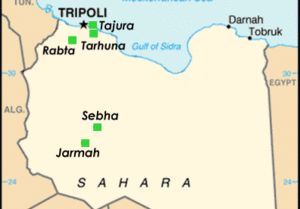WMD U.S. looks to keep Libyan WMD scientists away from terrorists
With Libyan rebels consolidating their hold over the country, the United States is looking to restart a State Department program designed to keep top Libyan biological and nuclear scientists from working for terrorist organizations or hostile nations; Libya’s new leaders have expressed their interest in working with the United States to keep track of Libyan WMD scientists and on other counter-proliferation programs, but the interim government has yet formally to respond to U.S. requests

Suspected Libyan WMD sites // Source: globalsecurity.org
With Libyan rebels consolidating their hold over the country, the United States is looking to restart a State Department program designed to keep top Libyan biological and nuclear scientists from working for terrorist organizations or hostile nations
For decades, Colonel Muammar Gaddafi had hundreds of experts working under him as he actively pursued nuclear and biological weapons. In 2003, Gaddafi agreed to stop building weapons of mass destruction and dismantle his research programs. Consequently, the United States launched a program to encourage Libyan weapons researchers into civilian research projects like water desalination, oil and gas production, and nuclear medicine.
According to an anonymous State Department official who spoke to the Associated Press, due to the instability of the country during the civil war, the United States was forced to suspend the program but is now looking to re-establish contact with the scientists.
The official said that Libya’s new leaders have expressed their interest in working with the United States to keep track of Libyan WMD scientists and on other counter-proliferation programs, but the interim government has yet to formally respond to U.S. requests.
During the civil war, the State Department sought to keep track of Libya’s WMD and scientists and so far has found no direct evidence that any had been lured away.
Last week, several Libyan WMD scientists re-established contact with U.S. officials and top U.S. scientists are working with the government to draft a list of key Libyan researchers that need to be located.
Bilal Saab, a Middle East expert from the Monterey Institute of International Studies, emphasized that securing Libya’s WMDs and weapons experts was critical for the United States, but given the current state of Libya, the interim government had more pressing concerns like defeating the remaining Gadhafi loyalists and stabilizing the country.
When Libya agreed to end its WMD program and surrender its unconventional weapons, the country had amassed 1,300 tons of chemicals that could be used to make a deadly nerve agent, 3,600 chemical bombs, twenty-three tons of mustard agent, and several thousand tons of uranium yellowcake – partially refined uranium ore for use in nuclear weapons
Colonel Gaddafi cooperated with the United States and destroyed much of his weapons stockpiles, but the process was never completed and the country still holds roughly half of its store of mustard agent, large portions of its uranium yellowcake supply, and radiological materials that can be used to build dirty bombs.
Furthermore, Colonel Gaddafi had been highly cooperative in dismantling his nuclear program, but less forthcoming in the state’s chemical program, which was used extensively against Chad in 1987.
